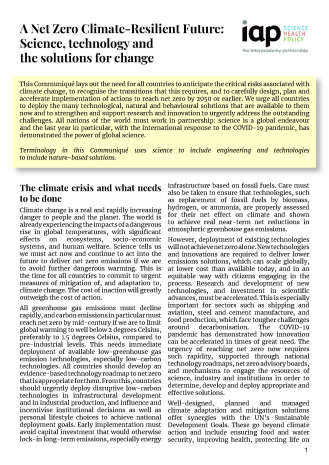This Communiqué lays out the need for all countries to anticipate the critical risks associated with climate change, to recognise the transitions that this requires, and to carefully design, plan and accelerate implementation of actions to reach net zero by 2050 or earlier.
We urge all countries to deploy the many technological, natural and behavioural solutions that are available to them now and to strengthen and support research and innovation to urgently address the outstanding challenges. All nations of the world must work in partnership: science is a global endeavour and the last year in particular, with the international response to the COVID-19 pandemic, has demonstrated the power of global science.
The climate crisis and what needs to be done
Climate change is a real and rapidly increasing danger to people and the planet. The world is already experiencing the impacts of a dangerous rise in global temperatures, with significant effects on ecosystems, socio-economic systems, and human welfare. Science tells us we must act now and continue to act into the future to deliver net zero emissions if we are to avoid further dangerous warming. This is the time for all countries to commit to urgent measures of mitigation of, and adaptation to, climate change. The cost of inaction will greatly outweigh the cost of action.
All greenhouse gas emissions must decline rapidly, and carbon emissions in particular must reach net zero by mid-century if we are to limit global warming to well below 2 degrees Celsius, preferably to 1.5 degrees Celsius, compared to pre-industrial levels. This needs immediate deployment of available low-greenhouse gas emission technologies, especially low-carbon technologies.
All countries should develop an evidence-based technology roadmap to net zero that is appropriate for them. From this, countries should urgently deploy disruptive low-carbon technologies in infrastructural development and in industrial production, and influence and incentivise institutional decisions as well as personal lifestyle choices to achieve national deployment goals.
Early implementation must avoid capital investment that would otherwise lock-in long-term emissions, especially energy infrastructure based on fossil fuels. Care must also be taken to ensure that technologies, such as replacement of fossil fuels by biomass, hydrogen, or ammonia, are properly assessed for their net effect on climate and shown to achieve real near-term net reductions in atmospheric greenhouse gas emissions.
Read the full communiqué A Net Zero Climate-Resilient Future: Science, technology and the solutions for change and the press release Climate Change: Without international collaboration, we won’t reach net zero by 2050, say world academies.
Working group members
| Member | Institution |
| Professor Peter Bruce FRS (Chair) | The Royal Society, The University of Oxford |
| Dr. Lisa Frost Ramsay | University of KwaZulu-Natal, South Africa |
| Distinguished Prof. Babajide Alo | University of Lagos, Nigeria |
| Professor Matthew England | University of New South Wales, Australia |
| Professor Won-Hoon Park | The Korean Academy of Science and Technology |
| Professor Michael Norton | European Academies' Science Advisory Council |
| Professor Asgeir Tomasgard | Norwegian University of Science and Technology |
| Professor Neven Duic | University of Zagreb, Croatia |
| Dr. Víctor Vilarrasa Riaño | Spanish Nationa Research Council |
| Professor Roberto Schaeffer | Brazilian Academy of Sciences |
| Professor Marilyn A. Brown | National Academy of Science, Georgia Institute of Technology, USA |

